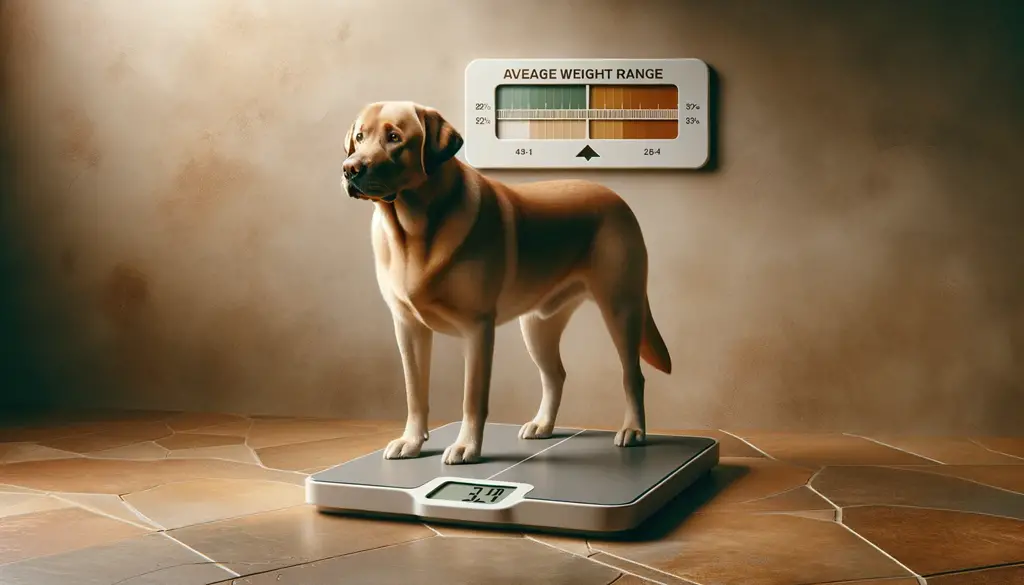Hey there! I’m a proud Lab parent, deep-diving into the world of our furry friends’ weight. Ever wondered, “How much should a Labrador weigh?” Well, you’re not alone. The American Kennel Club sets ranges, but many factors can swing the scale. Identifying an overweight Lab can be tricky, yet crucial. Join me as we explore the ins and outs of Labrador weight, ensuring our four-legged family members stay healthy and happy.
Labrador Weight Standards
In my experience, the weight of a Labrador Retriever can vary significantly, with males typically weighing between 65 and 80 pounds, and females falling in the 55 to 70 pound range, according to the American Kennel Club’s breed standard. Labrador growth patterns are a crucial part of understanding their ideal weight. Puppies tend to grow rapidly until they’re six months old, after which their growth slows down.
The ideal Labrador weight is not just about numbers on a scale. It’s also about the dog’s overall health and body condition. Their ribs should be palpable under a thin layer of fat, and they should have a visible waist when viewed from above. If these features aren’t apparent, it’s a clear sign of obesity.
Obesity in Labradors is a growing concern and can lead to a slew of health risks like diabetes, joint problems, and heart disease. Regular exercise is a fundamental part of preventing obesity. Labradors are active and energetic dogs, and they need plenty of physical activities to maintain a healthy weight and to keep them mentally stimulated.
Remember, it is not just about the amount of exercise; diet also plays a significant role. Overfeeding is a common problem, and pet parents need to ensure they’re feeding their Labs the right amount of high-quality dog food.
If you’re concerned about your Labrador’s weight, it’s best to consult a vet. They can provide you with a tailored diet and exercise plan to maintain your dog’s health, keeping the risks associated with being overweight at bay.
Expected Growth For A Puppy (Male/Female)
| Age | Male Weight | Female Weight |
|---|---|---|
| One month old | 3 – 5 lb | 2 – 6 lb |
| Two months old | 10 – 15 lb | 5 – 10 lb |
| Three months old | 20 – 30 lb | 20 – 25 lb |
| Four months old | 30 – 40 lb | 25 – 35 lb |
| Five months old | 35 – 45 lb | 30 – 40 lb |
| Six months old | 40 – 55 lb | 35 – 45 lb |
| Seven months old | 50 – 60 lb | 40 – 50 lb |
| Eight months old | 50 – 65 lb | 40 – 55 lb |
| Nine months old | 55 – 70 lb | 45 – 60 lb |
| Ten months old | 55 – 70 lb | 50 – 60 lb |
| 11 months old | 60 – 75 lb | 55 – 65 lb |
| 12 months old | 65 – 80 lb | 55 – 70 lb |
| Two years old | 65 – 80 lb | 55 – 70 lb |
Identifying an Overweight Labrador
Now, let’s tackle how to spot an overweight Labrador, a crucial step in ensuring your pup’s health and longevity. When your Labrador is overweight, you may notice difficulty breathing and a decrease in activity. Overweight Labradors may also show visible signs such as a lack of waist definition, excess fat around the hips, and difficulty feeling the ribs.
Being overweight brings certain health risks for your Labrador. These include joint problems, diabetes, and heart disease. It’s important to address any weight issues promptly to avoid these health complications.

| Signs of Overweight Labrador | Advice |
|---|---|
| Difficulty breathing or moving | Increase exercise routines |
| Lack of waist definition | Implement portion control |
| Excess fat around hips | Consider weight loss tips |
| Difficulty feeling ribs | Consult a vet |
To combat obesity in Labradors, consider these weight loss tips. Firstly, portion control is key. Overfeeding can lead to weight gain, so it’s important to monitor your Labrador’s food intake. Regular exercise routines are also crucial. Exercise helps burn off excess calories and maintains muscle tone.
However, before making any drastic changes, consult with a vet. They can provide professional advice tailored to your Labrador’s needs. Remember, the goal is a gradual return to a healthy weight, not instant results.
Identifying an overweight Labrador is the first step towards a healthier, happier dog. By recognizing the signs and taking the necessary steps, you can ensure your Labrador’s weight is managed effectively.
Maintaining a Healthy Labrador Weight
Understanding your Labrador’s weight issues is just the first part; it’s my responsibility to then implement strategies for maintaining my dog’s healthy weight. This is crucial to minimize health risks associated with obesity such as diabetes, heart disease, and joint problems.
To achieve a healthy weight for my Labrador, I rely on the following strategies:
- Balanced diet: I ensure my Labrador gets a diet rich in protein, healthy fats, and carbohydrates. I’m careful about portion control, serving my dog the right amount of food based on his age, size, and activity level.
- I also include fiber-rich foods and limit treats to ensure he doesn’t consume excessive calories.
- Consulting with a veterinarian is crucial for diet advice tailored to your dog’s needs.
- Regular exercise: An appropriate exercise routine is central to weight management.
- Daily walks, playtime in the park, and swimming are excellent ways to keep my Labrador active.
- It’s important to adjust the exercise routine as my dog ages or if he has health conditions.
Monitoring my dog’s weight regularly helps me identify any sudden weight gain or loss, which could indicate underlying health issues. If this happens, I seek veterinarian guidance promptly.

Frequently Asked Questions
What Is the Average Weight of a Labrador Puppy at Different Stages of Its Growth?”
As a puppy, a Labrador’s weight fluctuates based on diet, growth chart, and exercise impact. A feeding schedule is crucial for healthy weight gain. It’s like watching a tiny bean sprout into a robust tree!
Can the Weight of a Labrador Differ Based on Its Color or Subtype?”
As per my knowledge, a Labrador’s weight isn’t significantly influenced by its color or subtype. It’s more about their lifestyle, feeding habits, and exercise routines, rather than color-based genetics or subtype characteristics.
How Can I Tell if My Labrador Is Underweight and What Health Risks Does This Pose?”
Spotting an underweight Labrador tugs at my heart. Dietary adjustments, exercise regimen changes, and vet checks for parasite infection or medical conditions are essential. Genetics play a part too. Their health could be hanging in the balance.
Are There Specific Breeds of Labradors That Are More Prone to Weight-Related Issues?”
I’m not aware of specific Labrador breeds prone to weight issues. Genetic factors, diet influence, and exercise impact can contribute to Labrador obesity. Preventive measures include a balanced diet and consistent exercise.
How Does Spaying or Neutering Affect the Weight of a Labrador?”
Spaying or neutering can affect a Lab’s weight due to hormonal changes, possibly increasing obesity risks. This behavior shift modifies their exercise requirements, necessitating tailored weight control methods to maintain a healthy balance.
Conclusion
In conclusion, while the scales can give us a ballpark figure, understanding our Labrador‘s ideal weight isn’t a walk in the park. It’s a delicate dance between breed standards, individual health needs, and lifestyle. Armed with knowledge and a watchful eye, we can keep our Labs in the sweet spot of health – not too lean, nor too plump. Remember, a healthy Labrador isn’t about hitting an exact number, but maintaining a balanced, happy life.


